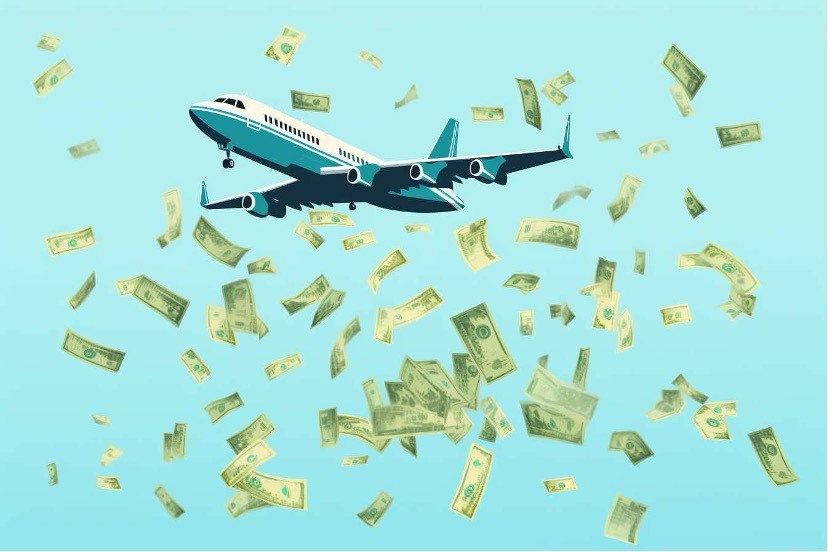Which airlines charge the most in extra fees?

Planning a new travel adventure often begins with booking flights. You can spend hours scouring comparison and airline websites looking for the best fare for your upcoming getaway. But airlines now frequently offer travelers a myriad of optional add-ons, adding a layer of complexity that may leave trip planners perplexed and frustrated.
The Rise of Extra Airline Fees
While it may seem like the norm now, the concept of airlines charging for additional services is a relatively recent development. Ryanair set the stage in 2006 by introducing a £2.50 fee (then, around $4.50) for checked luggage, followed by a £4 charge for “priority boarding” in 2007.
As online bookings gained popularity, other airlines joined in the practice, with their goal to present seemingly lower airfares while shifting certain costs to optional add-ons. Nowadays, 89% of airlines charge for one or more add-ons, with passengers facing extra costs for baggage, preferred seat selection, in-flight WiFi, and, in some cases, even online booking.
The extra fees add up. For example, baggage-fee revenue in the U.S. soared sevenfold since its introduction in 2007 ($440 million), to $3.15 billion in 2013.
Today both President Joe Biden and UK Prime Minister Rishi Sunak are trying to put an end to the lack of transparency around these extra charges, dubbed “drip-selling.” But airlines, still trying to recover from their coronavirus pandemic-induced drop in revenue (which some estimates put at $220 billion), are pushing back.
An Overview of Airline Add-On Fees
From baggage fees to seat selection charges and other unforeseen expenses, these extras can quickly add up, surpassing the initially advertised price. While not everyone may opt for these add-ons, some individuals, like families aiming to secure adjacent seats or those embarking on longer vacations, may consider them essential.
Navigating the realm of airline prices can be a bit of a puzzle. What appears to be a budget-friendly flight initially might reveal its true cost once additional add-ons come into play. The study reveals that airlines, on average, charge extra fees totaling $51.71, with seat selection charges the most prevalent extra fee. (Some budget airlines offer free seat allocation during online check-in, but they often separate passengers to encourage pre-booking; Ryanair, here’s looking at you!)
The U.S. airlines tend to have higher add-on fees compared to international airlines, while European carriers fall around the average. Being aware of which airlines charge the highest additional fees and understanding what those fees entail can help travelers make more informed decisions when booking their next flight.
The Worst Offenders
A company called NetVoucherCodes reviewed the add-on fee policies of 80 airlines operating in Europe, America, and the rest of the world. You can view the whole report here. Here are some highlights of the survey:
Spirit Airlines was the worst offender worldwide. Ignore that Spirit price you see quoted on Kayak: The original cost of the fare in the NetVoucherCodes study was $21.89, but the additional costs added up to $161.12, over seven times the base fare, with carry-on and checked baggage charges accounting for most of the increase. Others at the top were Volaris, Frontier, and Sun Country.
Ryanair topped the list of European carriers (fees upped the actual flight cost by 344%). However, due to their incredibly low base fare, cheaper than all other European airlines in the study, it’s clear that Ryanair is giving passengers the benefit of a cheap flight, with additional add-ons able to be selected as desired.
Etihad led non-European international carriers with a 401% difference between the original flight cost and extra fees, mainly due to its high check-in baggage costs. Interestingly, no international airlines imposed fees for carry-on baggage. And only ten out of the thirty-one non-European airlines charged for seat selection while even fewer charged for check-in luggage.
Frontier, Aeromexico, and Spirit try to upsell the most during the booking process. The good guys were Southwest and Air Canada, with their initial fares closest to the price actually paid.
How to Avoid the Most Common Additional Fees
Here are five tips on how to avoid extra fees from airlines:
To avoid baggage fees, try fitting all your belongings into a carry-on bag, as these tend to be free with budget airlines. Pack strategically to avoid overweight baggage fees.
Research airline seat selection fees. Consider skipping seat selection during booking and instead choose seats for free during online check-in. If you’re traveling in a group, book tickets together to increase the chances of being seated together without paying extra for seat selection. To avoid seat selection fees altogether, try asking to be seated together at the airport during check-in or consider changing seats once onboard your flight, as passengers are typically seated within close proximity.
If you need to check a bag, purchase the add-on online in advance, as it’s usually cheaper than paying at the check-in counter. Be aware of size and weight restrictions for carry-on and checked bags to avoid additional charges.
Research the airline’s change fee policy before booking. Consider making changes within 24 hours of booking or explore options for refunds through credit card travel insurance.
Flying long-haul? Research meal options beforehand to understand what’s included and avoid being stung by on-flight prices. Often it’s better to prepare snacks beforehand and bring a reusable water bottle to avoid high in-flight food and beverage costs.
Twist’s Take: Be aware airline add-on fees can substantially increase your final airfare price.
